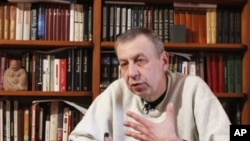Andrei Sannikov ran for president of Belarus in December 2010 against Alexander Lukashenko, ruler of Belarus since 1994. For his pains, Sannikov and six other presidential candidates were beaten by police and jailed. On Saturday night, the eve of Orthodox Christian Easter, Sannikov was unexpectedly released from jail.
After 16 months in jail, Andrei Sannikov said Monday that he was literally blinking in the sunshine.
He spoke of his sudden reunion in Minsk with his wife, Irina, and their four year old son, Danil.
“Fantastic; that was something I waited for so long, and I hoped - not every day, [but] every second - I hoped that it would happen, and finally it happened,”
Sannikov, a former deputy foreign minister, honed his English while working as a diplomat in New York. He said he fears for the 15 other political prisoners in Belarus, including one other former presidential candidate.
Sannikov was released early from a five-year sentence. He described the pressure of living in a high security prison, controlled by a security agency still called in Belarus, the KGB.
“It was really unbearable psychologically, and physically also," he said. "There was a lot of pressure on me, threats, pressure and for almost four months I was in [a] solitary cell.”
As a politician, Sannikov led “European Belarus.” He said Belarus should look west and join the European Union. As leader of a cause popular among young people in this Central European nation, he said he felt that his life was always in danger in prison.
He said the most frightening times came when he was locked in prison railroad cars with criminals and moved from prison to prison.
“You can expect anything there because you are not controlling the situation," he said. "You are absolutely helpless. They could plant with you any criminal with whatever intentions or instructions. It was really very dangerous situation. You have to be on guard 24 hours a day.”
While Sannikov was in prison, President Alexander Lukashenko moved closer to Russia, receiving loans that saved Belarus from falling into a deep recession.
In the West, European countries saw no progress on human rights. They withdrew all their ambassadors and tightened sanctions against Lukashenko regime officials.
Sannikov praised the European Union for following Washington’s lead and adopting a tough sanctions policy.
He said the West should treat the Lukashenko government the way it once treated the Soviet Union.
"It was based on principle," said Sannikov. "So we have to base our policy, our activity here, in Belarus, on principle, and the West, the democratic world in general, has to base their policy on principle."
He said that the beating and jailing of almost all the opposition presidential candidates exposed to Europeans the clearly dictatorial nature of the Lukashenko government.
“Before, the regime was pretending that we are not a totalitarian state, that there is a kind of democracy here in Belarus, that the West does not understand," he said. "But on the 19th of December 2010, the regime declared itself a dictatorship and we are facing all the consequences now.”
After watching Alexander Lukashenko rule Belarus for 18 years, Sannikov said the only language the dictator responds to is pressure.





